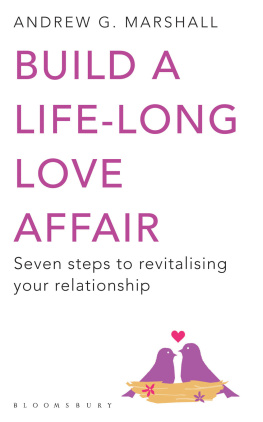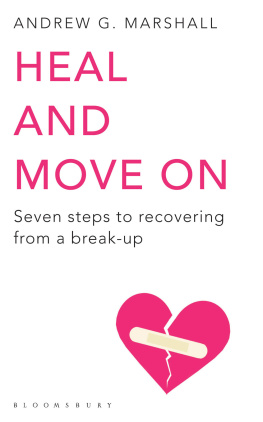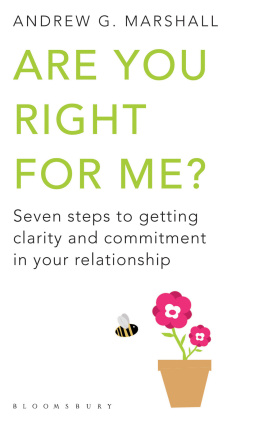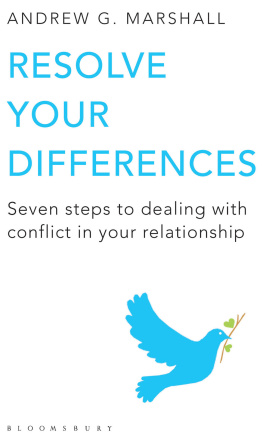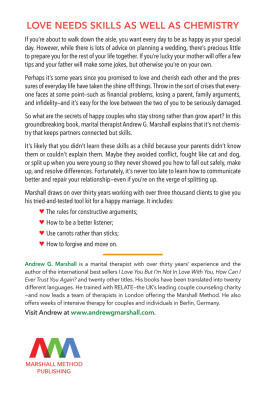Andrew G. Marshall is a marital therapist and the author of I Love You But Im Not In Love With You: Seven Steps to Saving Your Relationship , The Single Trap: The Two-step Guide to Escaping It and Finding Lasting Love and How Can I Ever Trust You Again?: Infidelity: From Discovery to Recovery in Seven Steps . He writes for The Times , the Mail on Sunday , the Guardian , Psychologies and womens magazines around the world. His work has been translated into over fifteen languages. Andrew trained with RELATE and has a private practice offering counselling, workshops, training days and inspirational talks.
www.andrewgmarshall.com
1. Lifting the Lid
- There are two equally unhelpful myths about love.
- The first claims true love lasts for ever and that once soulmates find each other, all problems melt away. Unfortunately, this overlooks the impact of real life plus the energy, skills and commitment needed to make love work.
- The second celebrates the magic of falling in love but expects daily life to drain away the passion, cites the high divorce rates and thinks the best we can hope for is a series of short-term affairs.
- The truth lies somewhere in the middle of these two myths. It is possible to build a life-long love affair but only if we understand love, how it changes over time and what is needed for it to endure.
- After all, unless we understand love, it is impossible to let our partner know what we need.
Checkpoint: Find the positive angle. Unfortunately, many people communicate in negatives. For example: We dont go out any more. Their partners become defensive, justify themselves or switch off. However, if you put the same thought into a positive I really enjoy it when we go out together your partner will feel complimented, committed and ready to please.
2. Diagnose Potential Problems
- There are six stages of love, each with its own challenges and special rewards.
- The problems arise when we expect love and each other to remain the same, preserved in aspic, rather than allowed to grow and change.
- If you follow the six stages, love grows stronger. The couples who have been together the longest are the most romantic.
- At the beginning, love is based on the promise of a life together; later it is built on the reality of a life shared.
Checkpoint: Take an interest in your partners life. He or she will feel truly cherished, especially if you are there for every aspect of his or her life not just the parts of which you approve or particularly enjoy. So go along and watch the finals of his five-a-side competition or help set up her adult education classs exhibition of craft work.
3. Improve Your Communication
- Couples who can talk over a problem and listen attentively to the others position can overcome any challenge.
- It is impossible for two people to live together without disagreements.
- Learn to argue with respect (praising each others good points, maintaining good eye contact and looking for solutions where everyone has a benefit).
- Avoid arguing with disrespect (jumping to conclusions, expecting your partner to be a mind-reader and counter complaining).
Checkpoint: If your partner has a strongly held opinion, there must be an important reason why he or she feels like that. Instead of dismissing these opinions as wrong or misguided, discover why your partner feels so passionately. Listen to the explanation, ask questions to be sure that you really understand and repeat back your conclusions (to check that they are right). If you give your partner this consideration, he or she will be more likely to hear you out too.
4. Boost Intimacy
- True intimacy depends on equality as it is hard to be open with someone we feel will control or judge us.
- If someone feels powerless for real or perceived reasons it frequently translates into a low sex-drive.
- Men often use sex to get close. Women usually need to be close to have sex.
- Good loving needs acceptance and trust.
- Dont be afraid to mix things up by finding new places to make love (like the bathroom or lovers lane) and bringing new things into the bedroom (like massage oils or dressing up).
Checkpoint: Set aside intimate time. Instead of waiting until both of you are in the mood and not tired, which probably happens less often than you would wish, plan ahead and put a date in your diaries. Make certain there is enough time to relax, put on some music and slow dance together, give each other a long massage and have a cuddle. Agree that it does not have to end in sex because it is about being physically intimate together and all the pressure to perform will be removed.
5. Balancing You and Me
- We need both to be ourselves and to be loved. Unfortunately, there can be an unspoken message in a relationship: If I dont like what you do, I wont love you any more.
- There are two competing fears in every relationship. On the one hand, we worry about being trapped and suffocated by our partner. On the other, we worry about being abandoned and alone in the world.
- It is very easy to blame our beloved for making us unhappy or driving us to the extremes of being clinging or needing space. However, it is more constructive to look at our own behaviour and how it contributes to the problem.
Checkpoint: Take the plank out of your own eye first. It is very easy to justify our own thoughtlessness or selfishness. Try extending the same privileges to your partner and re-examine their behaviour through this forgiving lens. How could you build bridges between the two of you?
6. Re-calibrating
- The constant demands of children, family, friends and work often make us put our relationship last. Because our partner loves us, we believe we can take them for granted. Up to a point, this is true.
- However, unless a relationship is nurtured, it will wither and die.
- We imagine that we should make grand gestures exotic holidays or expensive meals but lots of small ones are equally effective and create good habits.
- Think every day: what small thing can I do today to make my partner feel appreciated? It could be sending a text, buying a bar of their favourite chocolate when you fill up with petrol or telling them that you love them.
Checkpoint: We find it really difficult to give compliments. Maybe you didnt get compliments as a child because your parents were frightened of making you big-headed? Maybe praising your partner makes you uncomfortable perhaps he or she might think youre after something. Whatever the reason for not praising, there is a danger that your partner will feel taken for granted. Make a resolution to try and say thank you, or give a compliment every day. Although this might feel forced to start off with, it will soon become second nature.
7. Maintaining
- Love cannot be taken for granted. It takes continued investment of time, energy and commitment.
- Respect is the greatest gift that you can give your partner. All partnerships go through phases of questioning their love for each other. However, if you still respect each other, the relationship will emerge safely out the other side.
- Marriage, like water, always finds it own level. In good relationships we match up with someone with a similar intelligence, talent and looks. So in respecting our partner, we are also respecting ourselves.
Checkpoint: Keep things fresh. Once a week try and do something different. It might be sitting down and watching your partners favourite TV show with him or her, arranging a surprise trip to the theatre together, or doing something out of character.
Final Nutshell:
- Although falling in love is a magic experience, relationships grow stronger and deeper over time as they put down roots based on trust, commitment and compassion.
Next page
